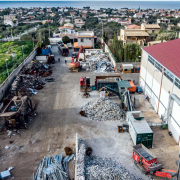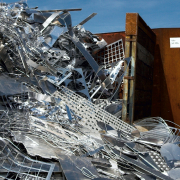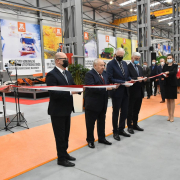Ferrous Division: Shifting Markets for Scrap as Traders Look East
Ferrous markets have seen a remarkable turnaround in fortunes in the past year with EU steel production declining; Turkish production and steel scrap imports also down; and a contrasting growth in Indian scrap buying, BIR’s Ferrous Division was told in Dubai on October 17, 2022.
In a presentation entitled “Steel scrap markets in 2022: Turkish trouble and Asian ascendance”,
Lee Allen, senior price reporter at Fastmarkets, said: “What a difference a year makes. Healthy recovery in the EU and across the European continent has given way to cuts in capacity utilisation. It’s been a year when Turkey has struggled to consume and imports volumes and those volumes have been replaced by South Asian buying. It’s an enormous change of fortune.”
Against a backdrop of a 20.2% year-on-year fall in Turkey’s steel production in July 2022 and a 40.9% year-on-year slump in steel scrap imports in July, Mr Allen also noted that demand for finished steel has been poor. “These trends do not come without consequences for scrap sellers across the world.”
While higher energy costs and lower demand had played their part, the commodities specialist also indicated how Russia’s invasion of Ukraine had been “a large contributing factor” in lower prices for scrap. Unable to sell in many markets because of sanctions, Russian billet traders had turned to Turkey offering cut-price deals. Mr Allen pointed out that, while billet from Russia had rarely been over 50,000 tonnes per month before the conflict, by May that total was over 200,000 tonnes. He said it was no coincidence that Fastmarkets’ cfr Turkey HMS (80:20) steel scrap price average had dropped from US$ 631 per tonne in April to a little over US$ 350 per tonne in September as the competition bit.
Turning to the Indian market, he noted a growing preference for bulk scrap in the region. “India has seen exponential increases in bulk steel scrap bought in recent months… with bulk prices becoming cheaper than containerised scrap.”
Mr Allen reported how traders in India had taken positions of large cargoes of bulk scrap to sell to the local market where it is broken up and distributed while retaining margins. “Last year we could not have predicted this,” he said. Fastmarkets forecasters, he added, were bullish on steel scrap and “fairly bearish” on steel.
The shift in emphasis in Europe was underlined by the Division’s President Dennis Reuter of TSR Recycling GmbH & Co KG in Germany in a subsequent panel discussion. “Inflows are not that high, to put it mildly, and we are really struggling to secure material. Due to energy prices, demand from the steel mills is not that great.”
A second presentation, from Sanjoy Kumar Ghosh, head of supply chain management, BSRM Steels Limited in Bangladesh, considered scrap demand, opportunities and future growth in that country. He pointed out that drivers included major new infrastructure projects and growing purchasing power with Bangladesh’s GDP expected to rise 7.2% this year. He, too, affirmed Mr Allen’s observations of a switch to bulk scrap imports, which had moving from roughly parity with container scrap in 2020 to a 68/32 split in the last financial year and 70/30 most recently.
Panellist Salam Al Sharif, of the Sharif Metals Group in Dubai, said the region’s steel industry had been transformed. “We have shifted from an export-orientated region to almost becoming a net importer,” he said. “They are getting all the metals in, demand is gearing higher and expansion in our steel mills is expected to increase three- to fourfold in the next five years.”
Mr Reuter concluded the session on a bright note by reminding attendees of the increasing customer and consumer pressure for “green” steel using scrap suited BIR members. “The primary producers of steel need us recyclers to bail them out. They will need all the [scrap] metal they can get their hands on. There is a reasonably good synergy between the consumer and the supplier [on this] so it could be a happy family over the next few years.”
Source: BIR (Brussels, 20 October 2022)








